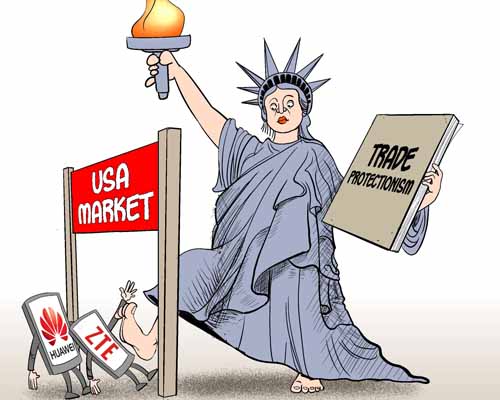US blocks Huawei and ZTE with Cold War mentality
- By Bai Ming
 0 Comment(s)
0 Comment(s) Print
Print E-mail China.org.cn, October 13, 2012
E-mail China.org.cn, October 13, 2012
In recent years, China has become a country that is well-suited for international trade. However, the U.S. has rejected this fact and has been discriminating against Chinese companies. A growing number of trade barriers have been erected to prevent Chinese companies from competing fairly in the U.S. market.
|
|
|
Free trade [By Jiao Haiyang/China.org.cn] |
In addition to providing its own companies with many favorable trade measures, the U.S. frequently implements anti-dumping and anti-subsidy penalties against Chinese companies. Americans became passionate about re-industrialization after the onset of the international financial crisis. The tit-for-tat trade battle that has been simmering in the background has been updated to version 2.0. New non-tariff barriers including technical barriers and green barriers are becoming more important.
The U.S. presidential election is just around the corner. However, Obama hasn't made enough progress in the American economic recovery to impress the general U.S. electorate. What's worse, he failed to score in the first presidential debate with GOP presidential nominee Mitt Romney. It's hardly a surprise that Obama has decided to cast China in a negative light.
The U.S. Congress appears to be good at cooperating with Obama. The House of Representatives U.S. Intelligence Committee released a report on Oct. 8, arguing that the U.S., whether government or private sector, should avoid doing business with Huawei Technologies Ltd. and ZTE Corp., China's two leading technology firms, because they pose a national security threat to the United States. Obviously, the U.S. this time feels that its trade protection package is not enough. It has decided to resort to an old Cold War mentality and focus its attention on limiting Chinese competitiveness.
Huawei and ZTE are now the second and fifth largest telecommunications equipment makers in the world. Their rapid growth has been recognized worldwide. These two companies have business operations in more than 100 countries and regions throughout the world. However, breaking into the lucrative U.S. market is a must for companies like Huawei and ZTE if they want to consolidate their growth potential. Unfortunately a succession of obstacles created by the U.S. has limited the two companies' chance to display their abilities.
Huawei already has a history of its proposed acquisitions of U.S. companies being shot down by U.S. regulators. A few years ago, a proposed acquisition by Huawei of 3Com was blocked by then U.S. President Bush, using the same excuse of security concerns back in 2008. What's the real intention behind this round of Congressional distrust? Have Huawei and ZTE grown strong enough to make the U.S. afraid? Definitely not!
Actually, the U.S. surely knows that Huawei and ZTE have neither the intention nor ability to threaten U.S. security. However, a lack of security threats does not translate into an absence of trade threats. It should be noted that although Huawei and ZTE have developed rapidly in recent years, they are in the process of enhancing their competitive advantage. It's not objective to say the two companies have secured an absolute competitive advantage over their U.S. peers. However, the Americans also pay special attention to dynamic development. In the past, China's household appliances industry lagged behind that of the U.S. for a number of years. Now it has overtaken the U.S. and has become the world's largest producer and exporter of household appliances. The same will happen with the communications equipment industry. Huawei and ZTE may not be as strong today, but they have the potential to overtake their U.S. peers. Delays are dangerous. So the U.S. resolved to nip them in the bud and has become increasingly hostile towards these two Chinese companies.
On the face of it, this seems quite reasonable. Every country has its own security concerns. However, both Huawei and ZTE claimed to have been open and transparent during the year-long investigation. Huawei said it was deeply misunderstood in the U.S, and ZTE said they were not surprised to see such an outcome. On the contrary, the U.S. has adopted a coldly dismissive manner, without bothering to "refute" Huawei and ZTE's explanation. In fact, "misunderstood" is a fairly polite way to describe the incident. Misunderstanding is not an unsolvable problem. As long as the two companies clarify the question, misunderstanding and mistrust from the U.S. side will be removed, and they could then continue with business operations in the U.S. However, it now appears that the real intention of the U.S. is to limit competition from China.
In recent years, the U.S. has been vigorously advocating trade liberalization. However, it seems the U.S. has always been strict with other countries while frequently engaging in the practice itself. From the Huawei and ZTE cases, it seems that Uncle Sam's trade liberalization assertion is selective and applied only when there are political or economic points to be made.
On the contrary, China has provided U.S. information and communication technology (ICT) companies with fairly equal treatment that is strictly in line with the spirit of free trade. In fact, U.S. companies like Apple, Motorola, IBM and Microsoft in recent years have benefited from the opening up of the Chinese market.
The author is a researcher with the Ministry of Commerce.
(This article was first published in Chinese and translated by Li Huiru.)
Opinion articles reflect the views of their authors, not necessarily those of China.org.cn.






